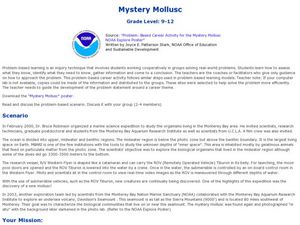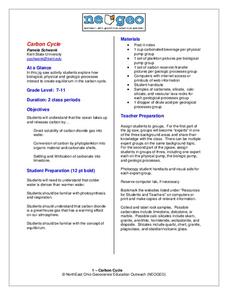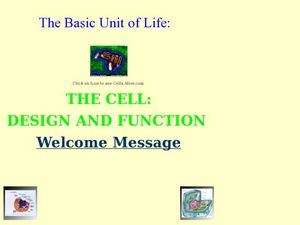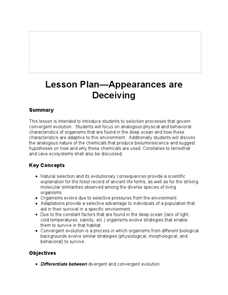Curated OER
West Nile Virus-What is the Risk?
Begin with an online pre-quiz about West Nile Virus. Using a fictional scenario, young epidemiologists read how it is transmitted and examine the stages of the life cycle of a mosquito. They imagine that they are members of the Centers...
Curated OER
Mystery Mollusc
Students investigate the different regions of our oceans by researching the Internet. In this oceanography lesson, students discover the different jobs related to ocean research and examine their roles by reading related websites. ...
PBS
Lesson Plan: “Seeing the Way: A Brief History of Cataract Surgery”
After looking at the history of cataract surgery techniques, your high schoolers will have a new perspective on medical and scientific advances. Kids alternate between watching short video clips, class discussion, and computer research....
Curated OER
Digital Mitosis and Claymation
Take mitosis and meiosis out of the biology textbook and onto the screen! An innovative class project prompts young biologists to create an animation movie using clay, showing the phases involved in mitosis or meiosis by moving the...
Curated OER
Classification: Dichotomous Key
Young scholars investigate the classification process and nomenclatures used for classifying organisms. They study dichotomous keys to identify organisms with 90% accuracy. Students organize information regarding the relatedness of species.
Curated OER
Transcription, Translation, and the Genetics of Microbes
Students construct various virus models using Fruit loops and Alphabits to represent nucleotides and molecules. They constructs capsomeres using shoes as the capsomeres and discuss various viruses.
Curated OER
Do You Have Change?
Students analyze data and complete a worksheet about land use change in a coastal region. In this land use lesson, students discuss events that cause land use changes in coastal areas. They construct a change table to summarize data on...
Curated OER
Anatomy and Physiology
Students explore anatomy and physiology using various activities. In this biology lesson, students reasearch about medical radiation and its applications. They study cell cycle, cell division and other processes that sustain life.
Curated OER
Specialized Structures and Environments
Fifth graders explore biology by completing an Internet activity in class. In this adaptation lesson, 5th graders identify several organisms and mammals that fight for their existence through slow changes to their anatomy over the course...
Curated OER
Human Body Board Game
Young scholars research a system of the body. They write questions and answers on game cards using Microsoft Word. Students play the game they created using a game board template from Word.
NorthEast Ohio Geoscience Education Outreach
Carbon Cycle
Using a jigsaw approach, earth science experts teach each other about the physical, biological, and geologic components of the carbon cycle, with a specific focus on the ocean.
Curated OER
USING the SCIENTIFIC METHOD for PROBLEM SOLVING
Students work in teams to map the scientific method as applied in a present day medical situation. Their collaboration of data and findings should lead to a mutual conclusion. Students watch a variety of video's concerning these situations.
Curated OER
Microscope Mania
Students examine parts of a microscope and how to use a microscope at five lab stations. They identify parts of a microscope by describing the differences between low power and high power. They visit Internet sites (included in the...
Curated OER
THE CELL: DESIGN AND FUNCTION
After studying the structure and functions of living cells using textbooks, internet or encyclopedias, learners prepare a PowerPoint presentation on cell structure and present it to the class.
Curated OER
Lesson Plan - Appearances are Deceiving
Herre is a lesson on divergent and convergent evolution. It has links to terrific video clips, an associate worksheet, and more. The analysis questions have been reviewed separately on Lesson Planet if you would like more information....
Curated OER
A Discourse on the History of Language
Analyze and make inferences from the information used by linguists to construct the evolution of languages. They research different dating techniques to explain how scientists infer age with evidence.
Polar Trec
What Is My Footprint?
How do one's habits and lifestyle choices affect the environment? Through a short online survey, learners will calculate their own carbon footprints then determine how to reduce their impact on the environment through simple steps, such...
Curated OER
That's Predictable - Stream Side Science
Research the impact that changes in biotic or abiotic factors might have on an ecosystem. Debate for or against the changes and take action in the community. This resource ideally follows stream studies that young ecologists may have...
Curated OER
Website Scavenger Hunt
Young scholars use the internet to complete a species scavenger hunt. In groups, they answer questions given to them about sea lions, rockfish and killer whales. As a class, they identify any questions they have and discuss the role...
Curated OER
Weapons of Mass Desctruction in Iraq
Students analyze the chemical and biological weapons of mass destruction that Iraq is accused of having. Students investigate the history and resolutions that have been made regarding bioterrorism.
Curated OER
A Reef of Your Own
High schoolers research and study the life and reproductive strategies of reef building corals. They examine how coral reefs can produce high levels of biological material when they are surviving in areas of low nutrition.
Biology Junction
Reptiles Crossword Puzzle
In this biology worksheet, students complete a crossword puzzle with 35 questions about reptiles. They identify the different types of reptiles.
Curated OER
Scientific Graphs
Students organize data collected from their experiments using graphs. For this statistics and biology lesson, students organize their scientific data from an article into readable graphs. They define the usefulness of their graph and...
Curated OER
Alternative Energy
Learners discover the different alternative fuel sources. For this biology lesson, students identify the different stages of the carbon cycle. They explain the pros and cons of using alternative energy.

























